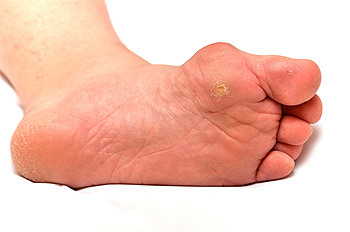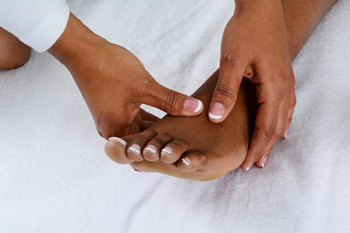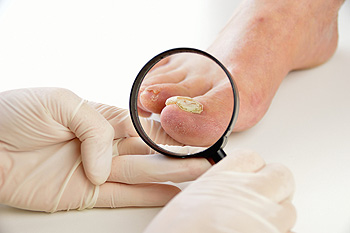Connect With Us
Blog
Items filtered by date: July 2020
Treatment and Prevention for Corns
 Corns may develop as a natural protective measure against the pressure and friction endured by your feet. Over time, corns can become uncomfortable as the skin thickens, cracks, or becomes tender. If you have corns on your feet it is recommended to avoid taking long walks or standing for prolonged periods of time, as this could further aggravate the skin. To prevent corns, you may try wearing cushioned socks, wearing comfortable well-fitting shoes, using heel pads or insoles, regularly moisturizing your feet, and avoid walking barefoot. Seeing a podiatrist for your corns is also beneficial. A podiatrist can recommend appropriate footwear, remove callused skin, and prescribe additional treatments to reduce your pain and prevent corns from recurring in the future.
Corns may develop as a natural protective measure against the pressure and friction endured by your feet. Over time, corns can become uncomfortable as the skin thickens, cracks, or becomes tender. If you have corns on your feet it is recommended to avoid taking long walks or standing for prolonged periods of time, as this could further aggravate the skin. To prevent corns, you may try wearing cushioned socks, wearing comfortable well-fitting shoes, using heel pads or insoles, regularly moisturizing your feet, and avoid walking barefoot. Seeing a podiatrist for your corns is also beneficial. A podiatrist can recommend appropriate footwear, remove callused skin, and prescribe additional treatments to reduce your pain and prevent corns from recurring in the future.
Corns can make walking very painful and should be treated immediately. If you have questions regarding your feet and ankles, contact Scott Matthews, DPM, MD of Salem Foot Care . Our doctor will treat your foot and ankle needs.
Corns: What Are They? And How Do You Get Rid of Them?
Corns are thickened areas on the skin that can become painful. They are caused by excessive pressure and friction on the skin. Corns press into the deeper layers of the skin and are usually round in shape.
Ways to Prevent Corns
There are many ways to get rid of painful corns such as:
- Wearing properly fitting shoes that have been measured by a professional
- Wearing shoes that are not sharply pointed or have high heels
- Wearing only shoes that offer support
Treating Corns
Although most corns slowly disappear when the friction or pressure stops, this isn’t always the case. Consult with your podiatrist to determine the best treatment option for your case of corns.
If you have any questions please feel free to contact our office located in Wikesboro, NC . We offer the newest diagnostic and treatment technologies for all your foot and ankle needs.
What Causes Plantar Warts?
 Warts, which can grow throughout the body, are outgrowths on the skin that are caused by human papillomavirus (HPV). Warts can be very contagious, and they can spread through skin-to-skin contact or through sharing personal items. Plantar warts grow on the bottom of the feet and usually have tiny black dots in them. Generally, warts disappear over time, but it may take months for them to do so. While plantar warts are usually harmless, they can be very painful. There are a variety of treatment options for warts that are causing pain, including chemical treatments and lasers. Some podiatrists may even elect to surgically remove warts that have become a problem. If you are experiencing painful plantar warts, make sure to discuss with a podiatrist which treatment options may be right for you.
Warts, which can grow throughout the body, are outgrowths on the skin that are caused by human papillomavirus (HPV). Warts can be very contagious, and they can spread through skin-to-skin contact or through sharing personal items. Plantar warts grow on the bottom of the feet and usually have tiny black dots in them. Generally, warts disappear over time, but it may take months for them to do so. While plantar warts are usually harmless, they can be very painful. There are a variety of treatment options for warts that are causing pain, including chemical treatments and lasers. Some podiatrists may even elect to surgically remove warts that have become a problem. If you are experiencing painful plantar warts, make sure to discuss with a podiatrist which treatment options may be right for you.
Plantar warts can be very uncomfortable. If you need your feet checked, contact Scott Matthews, DPM, MD from Salem Foot Care . Our doctor will assist you with all of your foot and ankle needs.
About Plantar Warts
Plantar warts are the result of HPV, or human papillomavirus, getting into open wounds on the feet. They are mostly found on the heels or balls of the feet.
While plantar warts are generally harmless, those experiencing excessive pain or those suffering from diabetes or a compromised immune system require immediate medical care. Plantar warts are easily diagnosed, usually through scraping off a bit of rough skin or by getting a biopsy.
Symptoms
- Lesions on the bottom of your feet, usually rough and grainy
- Hard or thick callused spots
- Wart seeds, which are small clotted blood vessels that look like little black spots
- Pain, discomfort, or tenderness of your feet when walking or standing
Treatment
- Freezing
- Electric tool removal
- Laser Treatment
- Topical Creams (prescription only)
- Over-the-counter medications
To help prevent developing plantar warts, avoid walking barefoot over abrasive surfaces that can cause cuts or wounds for HPV to get into. Avoiding direct contact with other warts, as well as not picking or rubbing existing warts, can help prevent the further spread of plantar warts. However, if you think you have developed plantar warts, speak to your podiatrist. He or she can diagnose the warts on your feet and recommend the appropriate treatment options.
If you have any questions please feel free to contact our office located in Wikesboro, NC . We offer the newest diagnostic and treatment technologies for all your foot and ankle needs.
Mild Relief for Ingrown Toenails
 The medical condition that is referred to as an ingrown toenail occurs when the edges of the nail grow into the surrounding skin. This can happen as a result of wearing shoes that do not have adequate room for the toes to move freely in. Additionally, it can develop from trimming the toenails incorrectly. This is an ailment that gradually develops, and may cause severe pain and discomfort. Patients may find relief when the affected nail is soaked in warm water, and this often helps to soften the skin. An effective treatment method consists of gently lifting the edge of the nail, which may be beneficial in reducing a portion of the swelling. If you are afflicted with an ingrown toenail, it is advised that you consult with a podiatrist who can properly treat this condition.
The medical condition that is referred to as an ingrown toenail occurs when the edges of the nail grow into the surrounding skin. This can happen as a result of wearing shoes that do not have adequate room for the toes to move freely in. Additionally, it can develop from trimming the toenails incorrectly. This is an ailment that gradually develops, and may cause severe pain and discomfort. Patients may find relief when the affected nail is soaked in warm water, and this often helps to soften the skin. An effective treatment method consists of gently lifting the edge of the nail, which may be beneficial in reducing a portion of the swelling. If you are afflicted with an ingrown toenail, it is advised that you consult with a podiatrist who can properly treat this condition.
Ingrown toenails may initially present themselves as a minor discomfort, but they may progress into an infection in the skin without proper treatment. For more information about ingrown toenails, contact Scott Matthews, DPM, MD of Salem Foot Care . Our doctor can provide the care you need to keep you pain-free and on your feet.
Ingrown Toenails
Ingrown toenails are caused when the corner or side of a toenail grows into the soft flesh surrounding it. They often result in redness, swelling, pain, and in some cases, infection. This condition typically affects the big toe and may recur if it is not treated properly.
Causes
- Improper toenail trimming
- Genetics
- Improper shoe fitting
- Injury from pedicures or nail picking
- Abnormal gait
- Poor hygiene
You are more likely to develop an ingrown toenail if you are obese, have diabetes, arthritis, or have any fungal infection in your nails. Additionally, people who have foot or toe deformities are at a higher risk of developing an ingrown toenail.
Symptoms
Some symptoms of ingrown toenails are redness, swelling, and pain. In rare cases, there may be a yellowish drainage coming from the nail.
Treatment
Ignoring an ingrown toenail can have serious complications. Infections of the nail border can progress to a deeper soft-tissue infection, which can then turn into a bone infection. You should always speak with your podiatrist if you suspect you have an ingrown toenail, especially if you have diabetes or poor circulation.
If you have any questions, please feel free to contact our office located in Wikesboro, NC . We offer the newest diagnostic and treatment technologies for all your foot care needs.
Toenail Fungus is an Infection
The medical condition that is known as toenail fungus may be common among older adults. It is an infection that is caused by a fungus that lives and thrives in warm and moist environments. These types of places include public swimming pools, communal shower room floors, and surrounding areas. It is considered to be contagious, and it is beneficial to wear appropriate shoes while in these areas. One of the first signs of this ailment is a white or yellow spot on the toenail. It is recommended that the affected nail is filed and buffed, as this may limit the amount of room the fungus has to grow in. If you are afflicted with toenail fungus, it is advised that you seek the counsel of a podiatrist who can properly treat this condition.
For more information about treatment, contact Scott Matthews, DPM, MD of Salem Foot Care . Our doctor can provide the care you need to keep you pain-free and on your feet.
Toenail Fungus Treatment
Toenail fungus is a condition that affects many people and can be especially hard to get rid of. Fortunately, there are several methods to go about treating and avoiding it.
Antifungals & Deterrence
Oral antifungal medicine has been shown to be effective in many cases. It is important to consult with a podiatrist to determine the proper regiment for you, or potentially explore other options.
Applying foot powder on the feet and shoes helps keep the feet free of moisture and sweat.
Sandals or open toed shoes – Wearing these will allow air movement and help keep feet dry. They also expose your feet to light, which fungus cannot tolerate. Socks with moisture wicking material also help as well.
If you have any questions please feel free to contact our office located in Wikesboro, NC . We offer the newest diagnostic tools and technology to treat your foot and ankle needs.
Blog Archives
- April 2024
- March 2024
- February 2024
- January 2024
- December 2023
- November 2023
- October 2023
- September 2023
- August 2023
- July 2023
- June 2023
- May 2023
- April 2023
- March 2023
- February 2023
- January 2023
- December 2022
- November 2022
- October 2022
- September 2022
- August 2022
- July 2022
- June 2022
- May 2022
- April 2022
- March 2022
- February 2022
- January 2022
- December 2021
- November 2021
- October 2021
- September 2021
- August 2021
- July 2021
- June 2021
- May 2021
- April 2021
- March 2021
- February 2021
- January 2021
- December 2020
- November 2020
- October 2020
- September 2020
- August 2020
- July 2020
- June 2020
- May 2020
- April 2020
- March 2020
- February 2020
- January 2020
- December 2019
- November 2019
- October 2019
- September 2019
- August 2019
- July 2019
- June 2019
- May 2019
- April 2019
- March 2019
- February 2019
- January 2019
- December 2018
- November 2018
- October 2018
- September 2018
- August 2018
- July 2018
- June 2018
- May 2018


